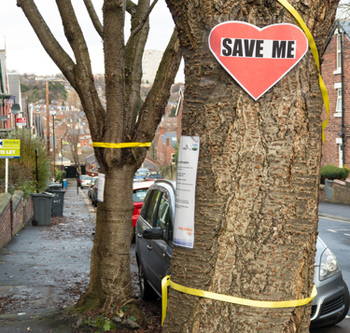A report into the Sheffield street trees scandal has laid the blame firmly at the door of the former leadership of the council for misleading its own independent panel and adopting 'unacceptable' tactics against opponents.
The report suggests the council persisted with a flawed strategy in the face of significant public opposition.
In a statement, Sir Mark Lowcock KCB, independent chair of the Street Trees Inquiry, noted that the streets of Sheffield were previously ‘in a sorry state’, from which they have improved, and that the only practical option available to the council from about 2005 when it was developing ideas on how to tackle problems with the highways, was a Private Finance Initiative scheme.
‘It was, essentially, a choice between PFI or potholes,’ he observed.
However, he said the plan for the cull of thousands of trees under the ‘Streets Ahead’ programme to be carried out by Amey was ‘flawed from the moment the contract was signed’. He added: ‘The serious dispute that then emerged, however, was not inevitable.’
Sir Mark found that the council had misinterpreted a 2007 analysis it had commissioned, which found that 74% of the city’s 35,000 street trees were mature or overmature as meaning that many trees were ‘ready for replacement’.
He said the inquiry did not find evidence that the council was malign or intending to mislead but this was ‘likely a result of misinterpretation, arising from the fact that the people making the key judgments on design issues were highway engineers not tree specialists’.

Sharrow, Sheffield, January 2017
Sir Mark said the Council was slow to understand the scale and nature of opposition to tree removal that was building gradually in several parts of the city from 2013 up to 2015 and that between 2016 and early 2018, its attitude hardened as it sought to deter the efforts of campaigners to block the tree replacement programme.
He noted that while the council had decided in 2015 to set up an Independent Tree Panel, it then misled the panel over what could be done at Amey’s cost under the contract, ‘as were the public and, later, the courts’.
He added: ‘The Inquiry did not find perjury or criminality but misleading the courts is a serious matter.’
Sir Mark also noted that the council rejected many of the panel’s recommendations ‘made in good faith to save trees’. He said: ‘Setting up an independent panel, misleading it and then ignoring substantial numbers of its recommendations was destructive of public trust and confidence.’
In relation to tactics against opponents, he commented: ‘Some of the things the council did were, in the view of the Inquiry, unacceptable. Some of the ideas it flirted with but did not pursue were worse.’
He said: ‘The Inquiry’s assessment is that what the campaigners saw as the council’s irrational, unreasonable, deceitful, dishonest, bullying and intimidating behaviour is what generated the determination, persistence, creativity and ingenuity that the campaigners displayed. The council’s behaviour, in other words, was the fuel that drove the protests.’
The inquiry also found that some people involved in or supportive of the campaign against the removals were ‘acting in unacceptable ways, including in harassing and abusing public officials and Amey staff’.
Sir Mark said however that while there may have been individual mistakes, ‘there is nothing to suggest an inappropriate approach by the police’.
He added: ‘Ultimately, the Inquiry’s view is that the police were put in an invidious position because it took too long for the council to adopt an approach which facilitated a calming of the dispute.’
He said: ‘Our conclusion is that the council’s behaviour amounted to a serious and sustained failure of strategic leadership. Responsibility for that ultimately rests with the political leadership, in particular the relevant Cabinet member and the Council Leader.’
Cllr Julie Dore was leader of Sheffield City Council from 2011 to 2021, most of the time covered by the report.
Sir Mark said that Amey also bears part of the responsibility, noting that late in the design phase the company advised against a cost saving proposal from the Council to reduce the tree replacement programme by half, from 17,500 to 8,750.
‘Amey’s advice, which the Council accepted, was substantially based on the rationale that a larger and front-loaded tree replacement programme would better facilitate the upgrading and maintenance of the built highways infrastructure.’
In a statement, chief executive Kate Josephs and current council leader Terry Fox said: ‘The council has already acknowledged that it got many things wrong in the handling of the street trees dispute, and we wish to reiterate our previous apologies for our failings. We have taken huge steps already to ensure past mistakes are not repeated and we hope the release of this report will further help us to learn lessons as we move forward from the dispute.’
Register now for full access
Register just once to get unrestricted, real-time coverage of the issues and challenges facing UK transport and highways engineers.
Full website content includes the latest news, exclusive commentary from leading industry figures and detailed topical analysis of the highways, transportation, environment and place-shaping sectors.
Use the link below to register your details for full, free access.
Already a registered? Login